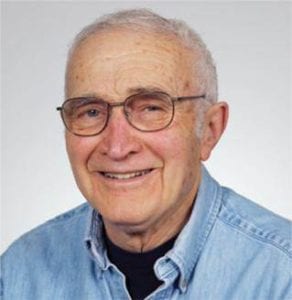Media Contact:
Nalini Padmanabhan
ASHG Communications Manager
301.634.7346
press@ashg.org
For Immediate Release
Thursday, June 30, 2016
9:00 am U.S. Eastern Time (UTC-04:00)
Geneticist to Receive Award at ASHG 2016 Annual Meeting

BETHESDA, MD – The American Society of Human Genetics (ASHG) has named Stanley M. Gartler, PhD, Professor Emeritus of Medicine (Medical Genetics) and Genome Sciences at the University of Washington in Seattle, as the 2016 recipient of the annual Victor A. McKusick Leadership Award.
This award, named in honor of the late Victor A. McKusick, MD, recognizes individuals whose professional achievements have fostered and enriched the development of human genetics as well as its assimilation into the broader context of science, medicine, and health. ASHG will present the McKusick Award, which will include a plaque and $10,000 prize, to Dr. Gartler on Tuesday, October 18, during ASHG’s 66th Annual Meeting in Vancouver, British Columbia.
Dr. Gartler has worked at the University of Washington for nearly 50 years. He was a founding member of the Division of Medical Genetics in the Department of Medicine in 1957, and later a founding member of the Department of Genetics in 1959. He has spent much of his career studying X chromosome inactivation and the genetics of somatic cells, but has made key discoveries and connections outside of these areas.
“Dr. Gartler is a giant in the field of human genetics and has conducted groundbreaking, cross-cutting research since the 1960s,” said Gail Jarvik, MD, PhD, at the University of Washington, a member of the ASHG Board of Directors and longtime colleague of Dr. Gartler. “He has a talent for learning the details of a particular genetic system and then applying this knowledge outside of that system, to answer questions no one else thought to ask,” she said.
By studying glucose-6-phosphate-dehydrogenase as a genetic marker in the 1960s, Dr. Gartler demonstrated that most human tumors were clonal, originating from a single cell. A few years later, when using markers to study crossing over in cultured cell lines, he found that many of the markers for different cell lines were identical, which led him to discover extensive HeLa contamination in many of these long-established lines. Using a similar, interdisciplinary approach, Dr. Gartler has worked with reproductive medicine specialists to address fundamental questions about fetal oocytes and the fate of the X chromosome in triploid cells.
In addition to his scientific leadership, ASHG also recognizes Dr. Gartler’s contributions to the Society and broader research community. A longtime member of ASHG, he belonged to its Board of Directors from 1986-1989, including a year as President in 1987; and was Chair of the Awards Committee from 1988-1990. He was elected a Fellow of the American Association for the Advancement of Science in 1962 and to the National Academy of Sciences in 1989, and is an honorary fellow at the American College of Human Genetics.
About the American Society of Human Genetics (ASHG)
Founded in 1948, the American Society of Human Genetics is the primary professional membership organization for human genetics specialists worldwide. Its nearly 8,000 members include researchers, academicians, clinicians, laboratory practice professionals, genetic counselors, nurses, and others with an interest in human genetics. The Society serves scientists, health professionals, and the public by providing forums to: (1) share research results through the ASHG Annual Meeting and in The American Journal of Human Genetics; (2) advance genetic research by advocating for research support; (3) educate current and future genetics professionals, health care providers, advocates, policymakers, educators, students, and the public about all aspects of human genetics; and (4) promote genetic services and support responsible social and scientific policies. For more information, visit: http://www.ashg.org.
9650 Rockville Pike | Bethesda, MD 20814 | 301.634.7300 | society@ashg.org | www.ashg.org
Connect with ASHG on Twitter (@GeneticsSociety) | Facebook | LinkedIn
